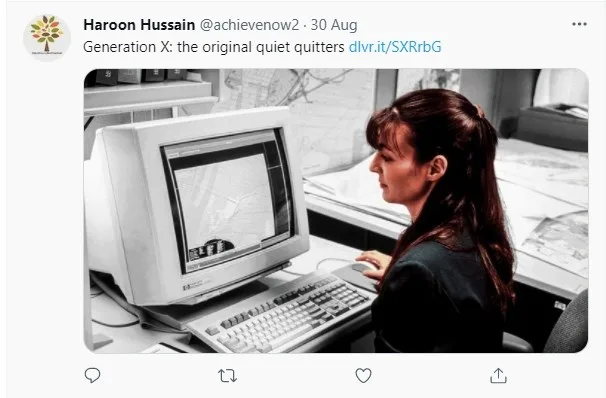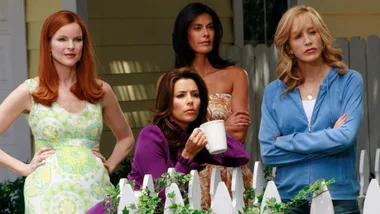What springs to mind when you think about generation X?” I ask my hairdresser, who is in her mid-thirties.
She puts down her scissors and squints at me in the mirror.
“I’m gen X,” I prompt.
Her brow furrows further.
“I mean, I feel like I don’t really have any thoughts about your generation,” she finally admits.
“You guys just sort of chug along and don’t harm anyone, do you? You’re not hoarding all the houses and wealth like the boomers and you’re not jumping up and down and loudly demanding stuff like gen Y. Yeah, no. You seem really nice, I guess, but other than that, I don’t really know what you are.”
“I don’t really know what you are” could easily be the generational tagline of those of us born between 1965 and 1980, the small, low-key, don’t-mind-us generation X.
Australia’s 2021 census showed that we’re not only metaphorically unseen, we’re also literally quite tiny, only a small blip of the population compared with other generations: there’s just 4.9 million of us compared with boomers and millennials who number almost 5.5 million each.
We were the latchkey kids, mostly left to raise ourselves as our “me generation” baby boomer parents – the first gen where both parents likely worked – yukked it up in the wealth-grubbing 1980s.
In the 1990s, when we were in our teens and 20s, they called us the “slacker generation” for reasons that aren’t entirely clear – possibly because we shrouded ourselves in flannelette shirts and floppy hair to blend into the background even more than we already did.

Ironically (and don’t we love a bit of irony, we cynical gen Xers), by the time we appeared in the workplace we’d shown everyone exactly how slacker we weren’t. As employees, we’re often described as hardworking, self-sufficient, uncomplaining and loyal, which is probably at least partly to do with the fact our DIY childhoods showed us that no-one was coming to save us except ourselves.
Despite our proven value in the workplace, we’re often still ignored even here (research from global consulting firm DDI showed that gen Xers are passed up for promotion in larger proportions than both baby boomers and millennials).
It’s telling that as part of my preparation for this story I put a call out to various research firms for any info they could give me about gen X’s characteristics in the workplace. An HR company responded right away with a long, detailed study of 35,000 workers documenting their varying attitudes to pay, performance and perks across various professions.
My eyes widened as I scanned the document. The only generations that were mentioned in the entire report were baby boomers, millennials and gen Z. Amazing. We even manage to get forgotten when we’re supposed to be a focus.
More evidence of my generation’s unending invisibility – like the time I approached a woman who looked to be around my age (mid-forties) coming the other way on a walking track and we both lunged wildly to either side of the track to avoid inconveniencing the other in any way.
Sometimes I ring my dad on the landline and merely say “Hi” when he answers, only to have him reply, “Sorry, who’s this?” (In fairness, this may be more a result of his baby boomer hearing loss than my absence from his radar.)

But then I spoke to two women who made me think that perhaps gen X is in the throes of, or maybe on the cusp of, a second wind. A flash of look-at-us visibility. A renaiss-X, if you will.
Donna Cameron (who, in her mid-fifties, is at the upper end of the generation X cut-off) is a former head-down, bum-up gen-X wage slave with a long career in the public service. When she was new in the workforce, she remembers doing that classic gen X thing of sitting back and waiting for her time to shine.
“When I was young I remember all these older people – mostly white males – whose views were really valued and respected,” she says.
“I looked quite young for my age and I felt no-one took me seriously. But I didn’t mind too much. I thought my time will come.”
But as the years ticked on, she started to twig that perhaps the moment when she’d rule the school wasn’t necessarily going to happen.
“By the time I reached my forties I started to see all these opportunities being filled by young people,” she says.
Her response was typically X-ish: she was selflessly delighted to see the young ones getting a go at things.
“How lovely that they’re nurturing these young things in a way that I wasn’t,” she recalls thinking, rolling her eyes at her own naivety. But then the young ones kept “coming and coming” and it hit Cameron that this was the new normal.
“I realised that as soon as I had experience on my side, businesses had started valuing youth … and I was no longer young!”
But rather than slouch down into her metaphorical hoodie and kick the ground listlessly with her Doc Martens, Cameron decided she had a choice: to fade further into the background or reinvent herself. She left the corporate workforce in 2012 and started out as a personal stylist, where she now helps women her age claim a little bit of the spotlight that was never handed to them by focusing on the way they dress and their overall presentation. In some cases it’s the first time these women have ever dared to make themselves seen.

“The women who come to me are often ones who are tired of being invisible,” Cameron says.
“They want to stand out and have fun – some of them for the first time ever. They’re energetic and curious and have this lust for life.” Some of them want to dress in bright colours, some of them are loving a chance to look sexy.
“They’re even loving their grey hair and wrinkles,” she adds.
“I find it so refreshing.”
Another woman who is watching gen Xers step out of their middle-child Jan Brady role and into a bit more of a sassy, assertive “Marcia” is divorce coach Carla Da Costa. Her clientele are primarily women in their late-thirties to mid-fifties, and she says that many of them are finally realising that their gen-X people-pleaser personality type isn’t serving them well anymore.
“I had one client, Julia, who was in her forties and had never had a relationship with a partner who had treated her well,” Da Costa says.
“It was toxic relationship after toxic relationship because she’d grown up believing she had to compromise to keep people in her life. It had cost her all of her confidence, and her personal goals and dreams had never been realised. It took five months of coaching but, by the end, she had started to realise that she didn’t have to be at other people’s beck and call. She became empowered.”
Having left her husband, she began dating again but on her terms: no more dickheads.
“It was so wonderful to see and I felt incredibly proud,” Da Costa says. “But this sort of change doesn’t just land in our laps, we have to put in the work.”
And that’s probably what all gen Xers have to realise if they want to shake off their invisibility cloak: it isn’t too late to make a big, bold life change but you have to stop doing what you thought you “should” be doing to turn things around. We’re in our forties and fifties, not our eighties and nineties.
There is a lot more life to live. Our baby boomer parents taught us to put our heads down and obey the rules but a better inspiration in 2022 should be our millennial colleagues and gen Z children, who change their lives like they change undies.
“I actually think it’s a pretty incredible time to be our age,” says Cameron.
“Having lived in a youth-obsessed culture for at least the past 20 years, it’s amazing that the older woman is having her moment.”
This story originally appeared in the October issue of marie claire.










